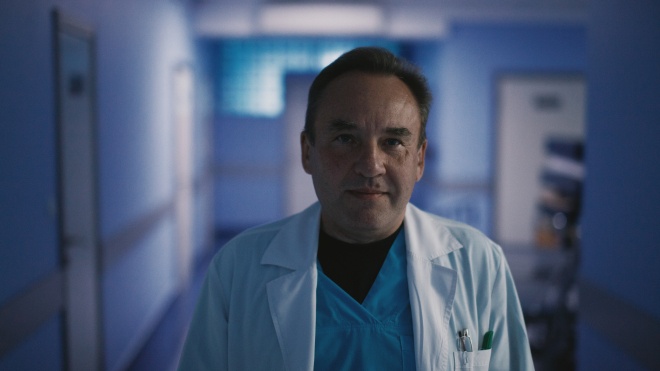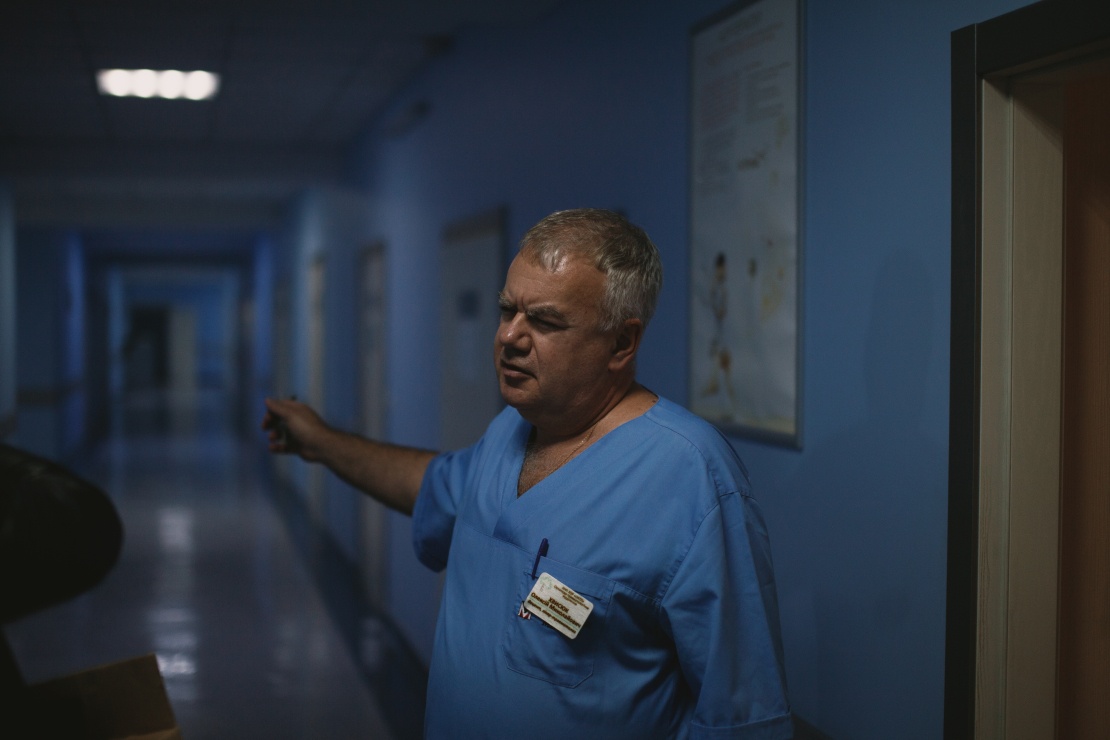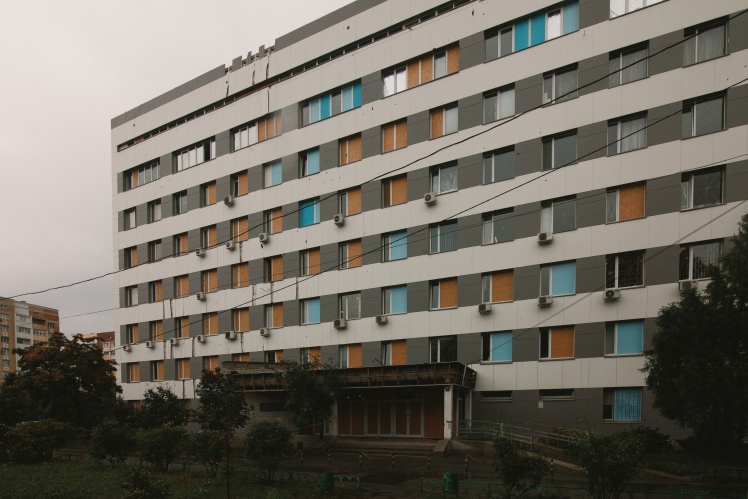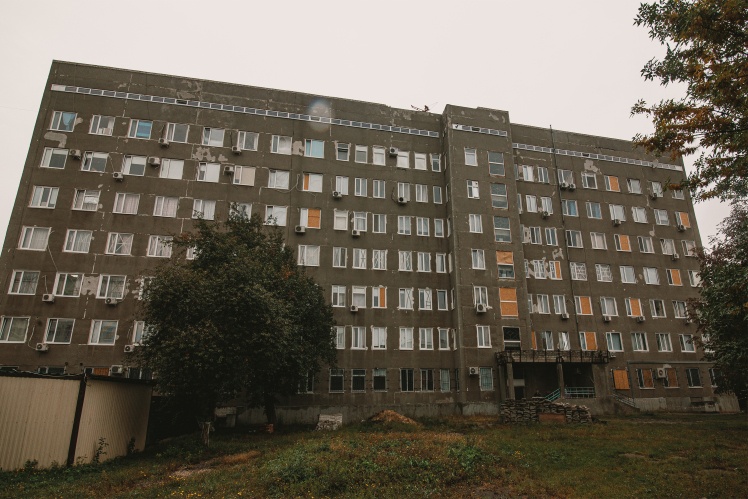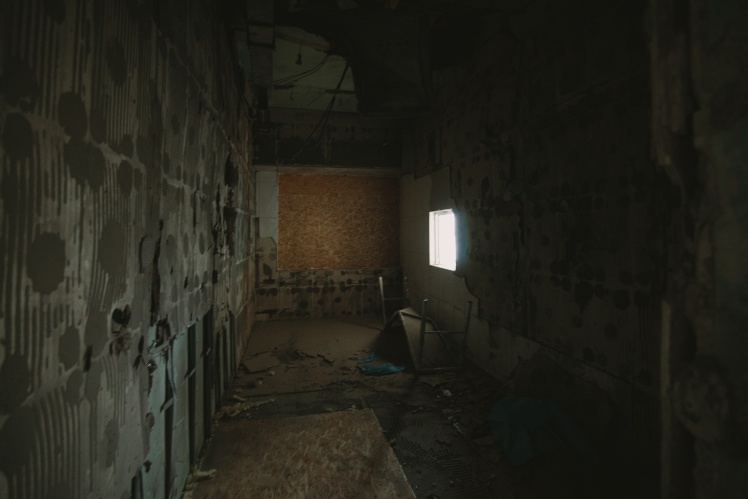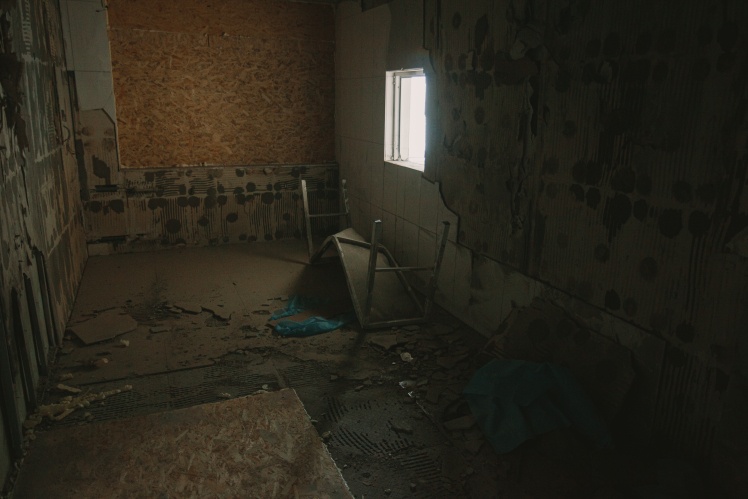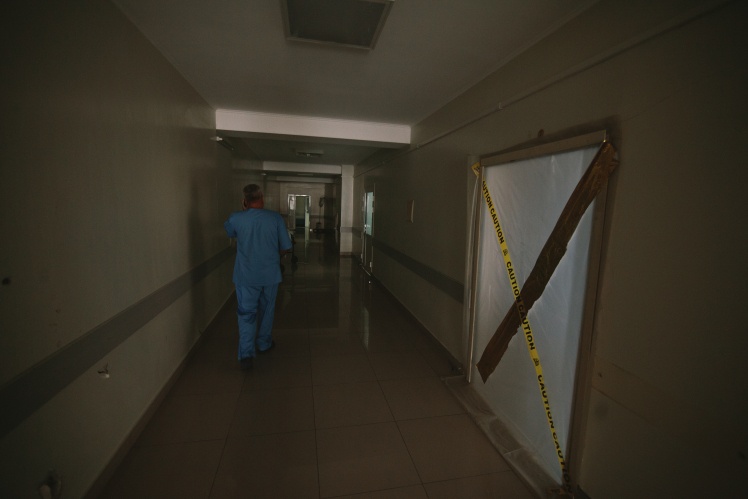1
At first glance, the hospital seems intact, but after a few moments battered walls and broken windows covered with plywood catch the eye. It makes no sense to repair all this in Kharkiv at the moment.
"Everything is broken, simply everything," says Oleksiy Khvysyuk, a senior doctor, climbing the stairs to the third floor in his department of traumatology and orthopedics. He didnʼt evidence the greatest destruction, because he spent the whole spring in the west of the country.
Oleksiy Khvysiuk
Mykhailo Melnychenko / «Babel'»
On the blue walls along the corridor are photos of Kharkiv — some of pictured buildings have already been destroyed by Russian missiles. We receive shoe covers, and already in them go to the surgery on the seventh floor.
Facades of different blocks of the hospital.
Mykhailo Melnychenko / «Babel'»
Oleksiy came to the hospital in 1991. Over the past thirty years, he saw many things, but never a destroyed operating room. In July, his own operating room, the 5th one, was hit by a projectile. The holes in the ceiling and walls were patched with plywood only at the beginning of September: hospital had to wait for a long time for a commission from the local authorities to assess the damage and document the crime of the Russians. Instead of a door, there is a transparent film. The pre-operative ward was completely destroyed, but the operating room itself was less damaged: windows were blown out, walls and some equipment were broken.
The projectile passed through the eighth and seventh floors and got stuck on the sixth, in the X-ray room. The X-ray unit hasnʼt been working here since February — one its part burned out, and the Italian manufacturing plant refused to hand the replacement over to Ukrainian volunteers because it allegedly doesnʼt support either side of the war.
Destroyed operating room No. 5.
Mykhailo Melnychenko / «Babel'»
"This is where the projectile landed," Nina Oborina, head of the therapeutic department, points to the corner of the room. “Two doors and a wall were knocked out, there is no window now. Metal carcass was sticking out everywhere. The linoleum melted, everything was in pieces. But we hardly touched anything for two months, we waited for the commission, and we donʼt know why it took so long for it to get here. Next, to officially decide what to do, they were waiting for a regional council session. In general, it was lucky that the projectile hit the building on Sunday, many people were at home, and the employees were not sleeping there, but on the first floor.”
Nina shows a video of the destruction in the summer.
Mykhailo Melnychenko / «Babel'»
Sleeping in the corridors of departments and on the first floor was not strange for Nina herself either: she lived in the hospital for the whole spring. There was no public transport in Kharkiv for three months, and it was dangerous to drive a car under shelling. But she doesnʼt want to talk about it, saying she has a lot of work.
Nina Oborina
Mykhailo Melnychenko / «Babel'»
2
60-year-old Ihor Denysov, an X-ray technician, shows that small rectangular non-working part from the X-ray. He has also been working in the hospital for 30 years — he supervises the operation of X-ray machines during operations and is the only one in the institution who repairs them. For half a year, in fact, his only route remains the path from the house, in front of which the shell fell, to his workplace, which is also under fire.
"I live fifteen minutes from the hospital," he says when we sit down in the office to talk. “Fifteen if you walk, ten if you run. I was running”.
Ihor says that he didnʼt notice the preparations for a possible invasion in the hospital.
Ihor Denysov
Mykhailo Melnychenko / «Babel'»
“There just were explosions — and a lot of wounded already. From the city, from the region, civilians, military. We took turns around the clock, without schedules, because why should we pile the people here? One person left the department immediately, and the other a month later — just couldnʼt withstand the daily shelling. The missiles hit the territory of the hospital four or five times, and were constantly hitting nearby. Ambulances, volunteers, and just people picked up someone [wounded] on the road. Oh my God, how many killed were there! The family was traveling in a car: the husband was wounded, the child was scratched, the mother was killed. In short, there was enough of everything”.
Ihor shows photos and videos made from the windows of the hospital — there is smoke on the horizon from all sides, sounds of missile hits are heard. There was a deceptive sense of security within the walls of the hospital. The operations were not stopped: local workers turned on the generator, instinctively crouched down, restrained the panic and trembling of the body. Ihor also struggled with hand tremors — he has diabetes.
Ihorʼs wife is a senior nurse who works in a polyclinic. From time to time she went to work with colleagues or walked under shelling. She had to write prescriptions for the chronically ill, help them with medication.
Other hospital workers transported their families here. They lived in the basement, but they also helped — carried water, collected broken glass after missile hits, unloaded humanitarian aid and food from volunteers. Some medics, already without their families, but still spend the night in the hospital: their homes, for example on the northern Saltivka, were destroyed.
Mykhailo Melnychenko / «Babel'»
Ihorʼs job was to make X-rays examinations during operations: there became much more iron in the crushed bones and torn soft tissues of the hospitalʼs patients. The digital X-ray worked, but when the light went out, the weak old generator did not power the computers. For the old X-ray, the film ran out, and when the water disappeared, it was impossible to develop it — somehow the workers managed to cope with the situation by changing the X-rays one by one. When the computers were not working, the data was written down by hand on paper, so that later it was transferred to the database of the NSZU — you still have to report. Now, Ihor is sure, there will be no such problem — thanks to the WHO, a new powerful generator has appeared in the hospital.
Mykhailo Melnychenko / «Babel'»
Now there is less work: people have left Kharkiv, the Armed Forces of Ukraine have pushed Russians away from the city.
“Mortars were the biggest threat: their projectiles could not be intercepted by anything, just bang-bang without an end. Every day, everything burned and burned. But to be honest, the silence is even worse than the shelling. Now you are constantly on your guard, waiting”, says Ihor. It is difficult for him to talk about the past six months. His hands begin to shake, so he avoids details. “All this was both simpler and scarier than I am telling. Now itʼs already funny for some reason: how doctors hid from shelling under their beds in their underpants at night. And now you just need to work, thatʼs all. If you start to think — then itʼs better to leave this place, because itʼs difficult. So we help ourselves as a team.
In farewell, Ihor tells the parable by Omar Khayyam about Death. Once Death was walking around the bazaar looking for Ahmet. His friends told him that he should hide, and he fled to another city. The next day, Death is looking for him again, and his friends say: "He is not there, what did you want?". And Death answers: "I wanted to say that I have a meeting with him 100 kilometers from here."
"So, you see, you wonʼt run away," adds Ihor shortly.
He did not hide during the shelling. He stayed in the hospital, waiting for the end. He tries not to remember what happened instead.
3
Oleksandr Karpov, who currently serves as the head of the hospitalʼs reception department, tells more willingly about that time. He has also been at the hospital since the 90s, but he has a new position since February: at that time, the head of the department stayed with his family in Turkey, and when he returned, he had no experience of working in combat conditions.
Oleksandr was on duty during the night from February 23 to 24. At first he did not believe that the invasion had really begun, and then the wounded began to arrive at the hospital.
Oleksandr Karpov
Mykhailo Melnychenko / «Babel'»
"When the Russians stood a few kilometers away from us under the bypass road, a lot of both military and civilians started to get here," he says. “The paramedics took the soldiers out of the red zone and brought them to us. One day an armored personnel carrier literally arrived, and half a hundred of wounded and dead poured out of it. The soldiers went back to battle, and we had to sort out the ones they left here”.
There had never been mass admissions to the hospital before, let alone such severe injuries. Every day there was a doctor-coordinator in the department who determined which group would take a new patient. The patient from the "black" category — the dead or in a state of agony — was immediately drawn with a cross, the "red" were taken to emergency surgery, the "yellow" were given help on the first floor, and the "green" were simply given a sedative and nurses sat with them for support and communication. There was no time for transportation to other institutions, so the condition was stabilized in traumatology, neurosurgeons rushed under fire from neighboring hospitals, and all simultaneously operated on injuries in which they specialize. When there was an opportunity, the ambulance took the stabilized wounded to specialized hospitals — Oleksandr says that thanks to this, significantly fewer patients died than they could have. The figure of fatalities is not named for ethical reasons.
At first, the hospital lacked either equipment or tools — for example, ordinary hospital scissors barely cut through a thick military uniform, there were almost no tourniquets and occlusive bandages. Later, volunteers started bringing it all. To protect the patients, the beds were moved into the corridors, and thick blankets were screwed to the window frames with screwdrivers. The doctors refreshed the knowledge from the courses of working with mine-explosive injuries that had been held since 2014, although they had not used this information before.
Mykhailo Melnychenko / «Babel'»
Shortly before the start of the counter-offensive of the Armed Forces of Ukraine, there were fewer patients in the Kharkiv region, probably due to the fact that those who could leave had already left the region. However, Oleksandr knows that now there will be more jobs after the de-occupation: people are returning to mined towns and villages or coming from the liberated territories to Kharkiv to treat old injuries. Thus, four patients from local hospitals were transferred to the trauma hospital in the first week after the deoccupation. At the moment, the ambulances do not go there yet, so people get to Kharkiv on their own.
Oleksandr still keeps in touch with some patients who have been in the hospital for six months: he knows about their injuries, where they are being treated abroad, how they are living.
“Roughly speaking, they and I have become one big family”, he says.
In memory of that time, Oleksandr did not leave any missile fragments or anything else material. He says that the main thing has already been preserved — the hospital.
“Do you know what struck me? That people, ordinary people helped the hospital. They handed over their generators when the power went out, brought us food and water, and charged our phones. Iʼm not talking about volunteers or pharmacy owners who gave us their supplies free of charge. This is the most valuable thing in life — our unity”.
Mykhailo Melnychenko / «Babel'»
4
“But we are not talking about any heroism, are we?”, asks hospital director Oleksandr Gavrykov, narrowing his eyes. A mattress, a pillow and an armored vest are still stacked under his desk, there is the flag of Ukraine in the corner. A meeting was held in his office every morning. “We did our job, although I donʼt consider it less heroic than what happens at the frontline. Though itʼs difficult to compare. Excessive heroism is annoying”.
For 84 days Oleksandr lived in the hospital, which he managed for 11 years. He has no photos of the wounded after February 24, except for the picture of the patient from the first day — a dirty soldier with shot legs, who was picked up on the bypass road. He turned out to be a 20-year-old Russian. He was operated on and handed over to the Security Service of Ukraine. Then Oleksandr listened to his interrogation — the rescued man said that he "came to liberate Kharkiv."
The processes of receiving patients were established during the first week. A few weeks later, Doctors Without Borders came to the medics and began to teach them how to work in combat conditions — despite the staffʼs skepticism, it turned out to be useful.
Oleksandr Gavrykov
Mykhailo Melnychenko / «Babel'»
At first, there were enough doctors, but over time some began to leave, as well as technical and junior medical personnel. The hospital was staffed by people from other institutions and volunteers who refused to work officially and receive a salary. Relatives of patients became nurses. The rotation between departments was constant. Under peaceful conditions, this couldnʼt be imagined.
“Those who ensured the vital activities of the hospital left it [due to hostilities]. A hospital is not just about surgeries. Itʼs also includes heating, water, sewage, food for patients and similar things,” says Oleksandr. “There were moments when we didnʼt know how to go on, but we managed. For example, our archivist came to the hospital about a week before the invasion, but stayed and covered all economic issues: someone had to keep a finger on the pulse and know what was bombed, what was missing, whether there was water.”
Doctors, their families, women with babies, dogs, cats, two parrots and, despite Alexanderʼs ban, people from neighboring houses lived together in the basements. He didnʼt want to leave anyone in trouble, but he had to take care of the hospital first of all. Now those people are grateful to him — and he laughs that there is nothing to be thankful for, because he kicked them out.
It was difficult with food, so volunteers came to the rescue. They fed everyone who was in the hospital — even the parrot, which Oleksandr didnʼt like, but rescued for his son. When the volunteers brought too much food, hospital workers distributed it to their neighbors.
“We tried to somehow diversify the food. I remember how happy I was when I managed to buy lemons and give them to people,” says Oleksandr. “Buying red fish was also like a holiday. And then we found grills, and on the first of May, barbecues were made in the yard of the hospital. And you walk through the hospital — and feel the smell of food. Someone is baking fritters in the intensive care unit. I think: ʼHoly crap, is this a hospital or a God-knows-what?ʼ. But as people donʼt live at home, they need to have such food delights.
Mykhailo Melnychenko / «Babel'»
Volunteers were sought by every doctor who had connections in other regions and abroad. Not all the help was appropriate — sometimes expired medicines or outdated equipment were brought. It was necessary to spend time on sorting. However, most of the cargoes were extremely important. For example, a familiar doctor from Germany sent 100,000 euros in aid, which was initially "lost" in a hub in the west of Ukraine, but still made its way to the hospital. The United help Ukraine fund also helped.
“There was a case when a friend bought a minibus for the hospital — ours was already old and could not go up the street with oxygen cylinders,” says Oleksandr. “The oxygen plant stopped working due to shelling, so the driver drove to the warehouse, where there was only one guard left, who gave cylinders, borrowed them from other hospitals. The driver did not drink for three weeks — it was scary to drive without drinking. The city was shelled with Grad missiles. Frankly speaking, we hardly left the building.”
But it wasnʼt safe inside the hospital either — and not just because of shelling. Sometimes grenades fell out of a soldierʼs pocket before an operation, or patients in a state of unhealthy excitement walked upstairs with loaded weapons. Now Oleksandr laughs at these stories, but then it was no joke. Looters with shot legs were also brought to the hospital:
"We helped them," says Oleksandr. “We cannot treat better or worse — doctors always do everything as good as possible, even if we donʼt like the patient and donʼt feel sorry for him. It does not depend on whether we are thanked or paid.”
Mykhailo Melnychenko / «Babel'»
During the active shelling of the city, Oleksandr almost doubled everyoneʼs salary — everyone got bonuses. At the same time, the funding of the hospital was only 1/12 of the usual, this happened to all institutions in the war zone. Thanks to the work of the accountant, the economist and the NSZU, the salary was never delayed. Necessary medicines and equipment were supplied by volunteers. And what is necessary — for example, diesel fuel for a new generator — was bought with their own funds, because such an expense item is not provided for the hospital by the state.
“Premiums were generally higher than the salary at first, now we are reducing them because we buy some medicines,” explains Oleksandr. “I donʼt save anything, I spend everything on wages. Because now itʼs often difficult for families in Kharkiv to work, and doctors who donʼt leave the city have to support their families.”
For half a year, Oleksandr, a surgeon, never entered the operating room — he was only a manager looking for means of survival for his hospital. He was afraid when after missile hits plaster fell on his head, and a projectile flew behind the window and did not explode. In his paper clip box are several pieces of shrapnel from the office next door that almost killed the parrot. On the table is a hospital renovation project that had to be completed in the spring. Now one of Oleksandrʼs main concerns is to make repairs before winter, because without paving, which protects against water, the building can simply be leveled.
“The day before yesterday, the director of the capital construction department called me in the morning and said that the Cabinet of Ministers had made a decision on the allocation of funds. He said that everything will be fine in the future, but we donʼt know when yet. If we survive the winter as it is, I donʼt know what will be left of the building”, Gavrykov says.
Mykhailo Melnychenko / «Babel'»
Oleksandr seems strict, but according to his wifeʼs instructions, he wears strings on his wrist for good luck — and laughs at this, blushing. He refuses to comment on whether there were training instructions from the Ministry of Health, but he does not know whether to condemn the heads of medical institutions that were under occupation. He himself says that he would not know how to act — no one explained how it is right: to run away or to remain a doctor until the end. The team decided to stay until the end, even though the area was shelled all the time. And Oleksandr says that he simply could not believe that Kharkiv could be occupied.
“I was born and lived here all my life, I love my city. And I want to die here — but not soon”, he says.
When we leave the directorʼs office, I ask Oleksiy, who was waiting for us, about whether he was criticized for leaving Kharkiv when his colleagues stayed in the hospital.
"It was difficult here, but it was also difficult there," he says. “I took my family and my 88-year-old father away, but when you do nothing for three months, and colleagues work here in inhumane conditions... It was a feeling of uselessness. We came back when it was a little calmer. The director warned that I might be treated differently. But this didnʼt happen. They experienced incredible things together, became closer to each other — but I donʼt feel that I have moved away from them”.
5
“Itʼs so good that you are talking about regional traumatology. They are just titans there,” says Viktoria Milyutina, a resident of Kharkiv, head of the northern department of the NSZU.
Viktoriya Milyutina says that the medical system of Kharkiv stood up and continued to work even under constant shelling — at the same time, there was no special preparation in case of a Russian invasion. Changes implemented in previous years became the basis of sustainability in many aspects.
Victoria Milyutina
In 2018-2019, medical institutions were computerized and began to be financed through the NSZU. Over the years, the system has been worked out, and for six months the hospital has been receiving money for its bills without interruption. At the end of February, Resolution No. 1440 was amended, which allowed all institutions in the zone of active hostilities to receive 1/12 of the previous funding, regardless of how many patients are left and what the doctors are doing.
“Now many residents have left Kharkiv, the load in terms of the number of patients has decreased ― for example, there are fewer births and children. But no one can say how much it has changed. Maybe half of this load has decreased”, Milyutina says.
In Kharkiv region, even institutions in the occupied towns and villages are financed — there were 22 of them in total. NSZU kept in touch with all of them all the time during the occupation — they transferred funds, received reports and requests for what lacks. To do this, doctors went to certain points where there still was connection. The money was not transferred only to the accounts of the Kupyansk hospital, where collaborators began to manage it, and the chief doctor was taken prisoner. He has now been released and is counting the losses. The hospital will receive all frozen funds.
"Now the chief doctors are assessing the damage," says Milyutina. “Some institutions have funds remaining in their accounts, which can be used to combat the consequences of the occupation. Some institutions were badly affected — for example, the Izyum hospital, where doctors worked in basements. The occupiers stole equipment. But hospitals are already receiving generous humanitarian aid.”
Mykhailo Melnychenko / «Babel'»
Victoria also explains that during active hostilities, hospitals were allowed to issue paper prescriptions, and later, when there was electricity, add them to the digital database. As for electricity itself, previous experience helped — due to the covid pandemic, starting from April 1, 2021, powerful generators and switches became a mandatory requirement for hospital contracting. Victoria says that at the time NSZU was criticized for this, but now it has helped the hospitals to work smoothly. She hopes that despite Russian strikes on critical infrastructure, hospitals will be able to rely on generators.
One of the biggest problems with the start of the invasion was the logistics of medicine. Critically important insulin, L-thyroxine, and cardiac drugs were in pharmacies, but the pharmacies were not working. Thatʼs why volunteer assistance and changes to regulatory documents worked — for example, insulin, for which patients previously had to pay a part of the cost, was now fully covered by the state, and it was enough to pick it up from the dispensing point.
Collaboration with Victoria Milyutina for Oksana Musienko and Patients of Ukraine NGO began with insulin.
Mykhailo Melnychenko / «Babel'»
“From the first days, we started working specifically on insulin," she says, "I searched for it around the country, and a volunteer from Kharkiv organized the logistics.”
To find insulin, Oksana contacted a Ukrainian pharmaceutical company. Then she also looked for metmorphine and L-thyroxine. The latter was received from a German pharmaceutical company. The scheme by which these deliveries worked was completely new: if earlier companies sold medicines through Ukrainian distributors, now they were given as free humanitarian aid directly to volunteers.
“Companies took risks and violated all corporate standards and procedures,” says Oksana Musienko. “And, to be honest, it used to be considered a bad idea for patient organizations to work with the pharmaceutical industry, because it has an interest in receiving funds from us. Therefore, it was all new and built on trust and personal contacts. We knew that despite the war, we had to report to them, conduct business correspondence, and be in touch all the time. In fact, we were forming a new culture of interaction between systems.”
When it became possible to get medicine, it was time to solve another problem — logistics. All previous ways provided by distributors have collapsed. For example, to deliver insulin, a temperature of -8 ℃ is required in the car — and such transport was difficult to find. All the aid was delivered in tons by trucks to a warehouse near Kharkiv, and from there everything was delivered in small batches to the city and the region. This was done by local volunteers, because the drivers of the distributors were afraid to leave. Oksana does not know how they managed to drive under fire and find fuel.
Non-working X-ray machine.
Mykhailo Melnychenko / «Babel'»
“We delivered medicine and equipment to the occupied territories as well,” says Oksana. “This was done by various organizations, but no one wants to talk about it, because the topic is too sensitive. It was done on personal contacts and adrenaline. For example, external fixation systems were transported to Chuguiv. Mobile and stationary ultrasound devices, VACs, x-rays, generators, even an ambulance were delivered to various towns and villages.
In addition, large batches of gloves, gowns, syringes, painkillers, hemostatic drugs, and antibiotics were delivered. Worked with Razom for Ukraine, Nova Ukraine funds. At the same time, since March, they have been in contact with the Ministry of Health and state enterprise Medical Procuremensts — every week with other funds in the WhatsApp chat, they volunteer checked what the needs are and whether they can be closed.
“The decline in large amounts of aid that went through us began in May,” says Oksana. “Then the state expanded, logistics were improved, the Affordable Medicines state program for cardiovascular drugs, drugs for people with mental disorders, and asthma was revived. Supplies of insulin, for example, now work according to the pre-war scheme. But we had to survive that chaos together.”
Now Patients of Ukraine together with the Ministry of Health and Medical Procurements record requests from hospitals on the MedData platform, through which humanitarian aid passes. So itʼs pssible to monitor requests at the state level.
As for the situation in Kharkiv region after the de-occupation of communities, Oksana says that the local authorities are coping on their own — people there need non-specific medicines and attention. Perhaps, after a complete demining, Patients of Ukraine will join the reconstruction of medical facilities, as they are already doing, for example, in the Kyiv region.
“I will never forget how we all became one at the beginning of the war — public organizations, state institutions and businesses. For the first three months, we rowed like crazy,” says Oksana at the end. “In fact, it happens differently in different areas, everywhere thereʼs its own specifics. But we can be proud of the way we worked in Kharkiv region during the worst times.”
Mykhailo Melnychenko / «Babel'»
Translated from Ukrainian by Anton Semyzhenko.
Doctors save lives, and Babel saves you from propaganda. Help us do this further: Patreon 🔸 [email protected]🔸donate in cryptocurrency🔸in hryvnia.
